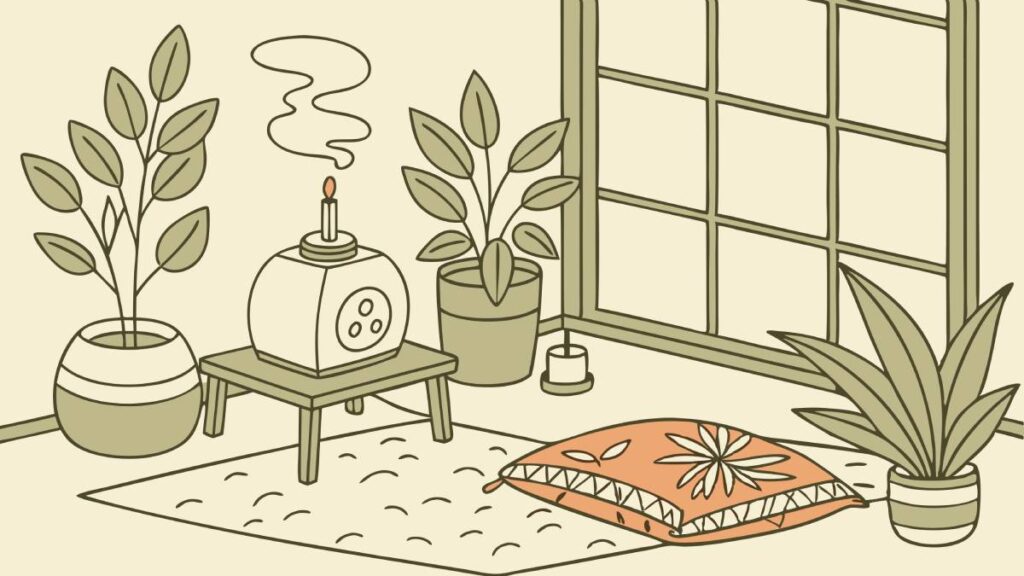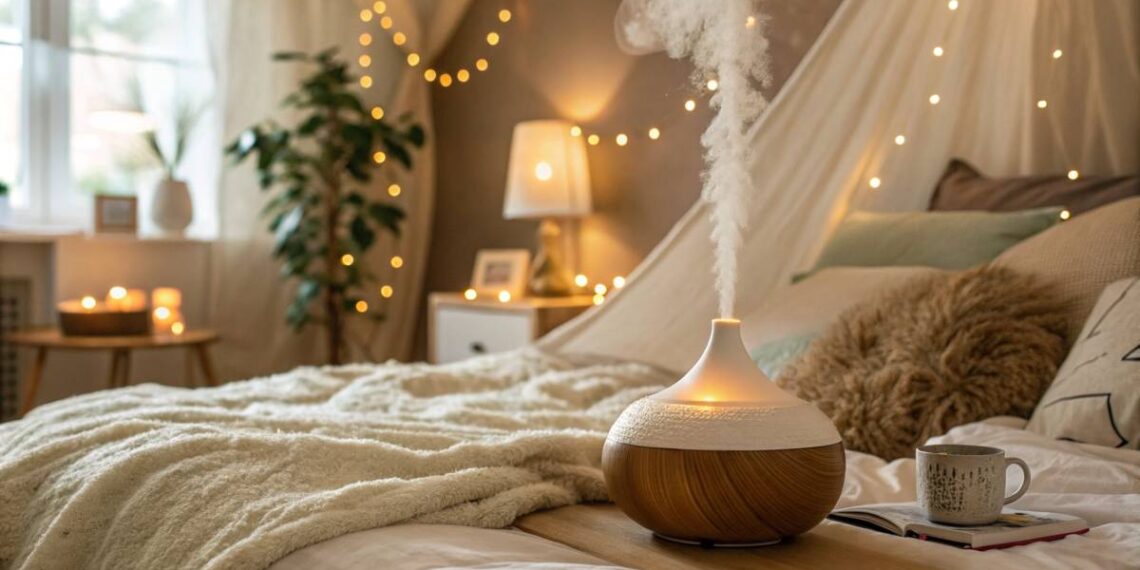Essential oils have become a popular and effective solution for those seeking a natural remedy to improve their sleep quality. As more people move away from pharmaceutical sleep aids, these fragrant, plant-based oils are taking center stage as a safe, holistic alternative.
From lavender’s calming properties to peppermint’s soothing effects on breathing, each oil offers a unique way to promote relaxation, reduce anxiety, and encourage restful slumber. Whether you’re battling sleepless nights or simply looking to enhance your bedtime routine, essential oils could be the key to unlocking a peaceful, rejuvenating sleep cycle.
Key Takeaways:
- Lavender Oil: Promotes relaxation, reduces stress, and has been shown to improve sleep quality. It’s known for its calming scent and effects on the nervous system.
- Chamomile Oil: Known for its ability to soothe anxiety, fight inflammation, and enhance sleep duration. Its sweet, apple-like aroma adds a calming touch to your bedtime.
- Cedarwood Oil: Ideal for inducing deep sleep, its warm, woodsy scent helps ease tension and creates a peaceful atmosphere. It’s particularly effective for stress reduction.
- Bergamot Oil: Alleviates anxiety and reduces stress, helping the body relax for a deeper, more restful sleep. It’s especially beneficial for those who experience emotional restlessness.
- Valerian Oil: A sleep-inducing powerhouse, known for its ability to calm nerves and help users fall asleep faster. It’s a great remedy for overcoming restless nights.
- Frankincense Oil: Promotes relaxation through aromatherapy and meditation. This oil is great for reducing anxiety and stress and enhancing sleep quality.
- Peppermint Oil: Eases breathing difficulties, reduces tension, and helps improve sleep quality, especially for those with respiratory issues.
- Safety Tips: Always dilute essential oils properly and be mindful of allergies, pregnancy, and interactions with medications.
Natural Sleep Enhancement with Essential Oils
Essential oils are becoming rockstars in the pursuit of better shut-eye. Folks wrestling with sleepless nights, parents hunting down nature-based fixes for their clan, and the health-savvy are all getting cozy with these sweet-smelling powerhouses.
Understanding How Essential Oils Can Help You Snooze
Essential oils, those pint-sized plant potions, are famed for their scents and soothing vibes. They can lend a hand in the sleep department by helping you chill out, ditch anxious thoughts, and set the scene for a peaceful slumber party with your pillow.
When you breathe in their aromas or smooth them on your skin, these oils give a nudge to certain brain parts, coaxing them into relaxation mode. Think of them as your brain’s bedtime storytellers, calming racing thoughts and worries that keep you tossing and turning. No wonder that aromatherapy for sleep is picking up steam as folks look for a calm way to hit the hay.
Why Using Essential Oils for Sleep is a Win
Beyond just catching more Zs, essential oils throw in a bunch of extras. Check out why they’re worth adding to your nighttime lineup:
| Benefit | Description |
|---|---|
| Promotes Relaxation | They whisper to your nerves to ease up and let go. |
| Reduces Anxiety | The chill factor washes away jitters. |
| Enhances Sleep Quality | Kicking back more can push you into that deep, dreamy sleep. |
| Natural Alternatives | Plant power for those trying to sidestep regular sleep meds. |
| User-Friendly | Works into bedtime routines with diffusers or oils rubbed in. |
A lot of folks find that when they mix these oils with other natural bedtime rituals—like deep breathing or pre-sleep stretching—they really hit the jackpot with their night’s rest. Crafting a sleep zone that’s just right can make nodding off as simple as pie.
Tossing essential oils into your bedtime rituals gives you a grab-bag of ways to up your sleep game. They don’t just help with sleep, they boost your whole feel-good ride. For those curious about going to nature in their sleep search, dabbling in essential oils is definitely worth the look.

Lavender Oil
Properties of Lavender Oil
Lavender oil’s like that trusty friend who always calms you down when you’re hyped up. Extracted from the flowers of the lavender plant, Lavandula angustifolia, this oil isn’t just about smelling nice—it’s packed with stuff like linalool and linalyl acetate that chill you out big time.
| Stuff Inside | What It Does |
|---|---|
| Linalool | Helps chill out nerves and makes you feel less wired |
| Linalyl Acetate | Lifts your mood and kicks stress to the curb |
The floral scent of lavender oil not only makes you go “ahhh…” but also might just help you catch those elusive Z’s.
“Lavender oil is a natural sleep remedy, known for its calming effects that reduce anxiety and promote deep, restful sleep.” – Aromatherapy Expert.
How Lavender Oil Promotes Relaxation and Sleep
When life’s got you feeling like a cat in a dog park, lavender oil’s got your back. Sniffing this oil can apparently drop your heartbeat and blood pressure, welcoming you into a zen zone.
The Journal of Alternative and Complementary Medicine once spilled the beans—folks who sniffed lavender oil before hitting the sheets said their sleep was deffo better, and they weren’t tossing and turning as much.
Here’s how to make lavender oil your sleeping buddy:
| Use It Like This | Here’s What Happens |
|---|---|
| Breathing it in | Running a diffuser in the bedroom turns your space into a calm cocoon perfect for sweet dreams. |
| Rubbing it on | Mix a bit with another oil, smear on your pulse points, and let your mind chill. |
| Soaking it in | Drop some in your bath to get ready for some serious snooze action. |
Bringing lavender oil into your evening routine is a great trick if you’re wrestling with the sleep monster or just want to sleep au naturel. Wanna know more about snoozing naturally? Check our piece on how to sleep better naturally.
Mixing lavender oil with relaxing stuff like sleep meditation techniques or breathing exercises for sleep might just boost its sleepy-time magic, making counting sheep a thing of the past.

Chamomile Oil
Properties of Chamomile Oil
Chamomile oil, plucked from those tiny daisy-looking flowers, is your go-to for chilling out. Packed with chamazulene and bisabolol—totally cool-sounding names, right?—this oil is like a warm, fragrant hug that smells a bit like apples. And who doesn’t like apples? It works wonders for helping you catch those z’s.
“Chamomile oil is one of the oldest and most trusted oils for inducing relaxation and improving sleep quality.” – Natural Sleep Specialist.
This oil isn’t just about getting good rest. It helps calm inflammation and fights off those pesky radicals, kinda like a superhero for your skin and general well-being. You might just wanna make this little bottle a staple in your bedtime routine. Check out this handy table that lays out the awesomeness of chamomile oil:
| Kind of Stuff | What It Does |
|---|---|
| Aroma | Smells all sweet, like apples |
| Main Active Bits | Chamazulene, Bisabolol |
| Health Perks | Fights inflammation, antioxidant power |
| Ways to Use | Sleep helper, relaxation, better skin |
How Chamomile Oil Induces Calmness for Better Sleep
Chamomile oil is like a whisperer for peace. Breathe it in or slather it on, and your nerves will start chillin’ out. Bye-bye stress and anxiety, hello sweet dreams!
Pop some in a diffuser before bed. Watch as your room turns into a calm sanctuary. Or, slap a little on your skin as you wind down for the night. You could even make bath time more zen by mixing it in with some bath salts.
Research suggests it might help you stay asleep longer, cutting down on those pesky wake-ups in the middle of the night. We got a whole piece on how to sleep better naturally if you want more tips.
Chamomile isn’t just for the sleepless: it’s great for parents looking for natural fixes and folks battling random sleep patterns. Dive into sleep meditation techniques or breathing exercises for sleep to find more ways to find calm.
Cedarwood Oil
Properties of Cedarwood Oil
Cedarwood oil comes straight from cedar trees, famous for their warm, woodsy, down-to-earth vibe. This essential oil isn’t just another fragrance; it’s packed with traits that are like a lullaby for your senses. It’s calming, with a touch of sedative powers, making stress and restlessness melt away. Its star compound, cedrol, is like a gentle hug, helping you chill out.
| Property | Description |
|---|---|
| Aroma | Warm, woodsy fragrance |
| Key Compound | Cedrol |
| Effects | Calm-inducing, sleepy-time vibes |
| Aroma Profile | Earthy, relax-and-unwind ready |
How Cedarwood Oil Supports Deep Sleep
Cedarwood oil works its magic by chatting with your limbic system—the brain’s cozy corner that decides how you feel and sleep. When it whispers sweet nothings to your senses, stress takes a hike, and slipping into dreamland becomes as easy as a summer breeze.

When it’s part of your nighttime ritual, cedarwood oil creates the perfect setting for snoozing that can be used in a diffuser or a steamy pre-bed bath. Researchers have given a nod to its power in stretching your deep sleep hours, making every nap count.
Team it up with other sleep heroes like lavender or chamomile, and you’ve got yourself a sleep-inducing cocktail. If you’re into that kinda stuff, we have more about snooze-boosting tricks in our piece on how to sleep better naturally.
For those who find counting sheep tedious, adding cedarwood oil to your sleep playlist might just be your thing. Dive into other zen zones—check out sleep meditation techniques and our guide for yoga poses for sleep to stack the odds in favor of catching those z’s.

Bergamot Oil
Properties of Bergamot Oil
Bergamot oil comes from the peel of the bergamot orange, a fruit that thrives in Mediterranean gardens. It’s got a fresh scent that’s like a vacation for your senses — kinda citrusy but with a floral twist that lifts you up while keeping you calm. No wonder folks swear by its sleep magic.
| Property | Description |
|---|---|
| Aroma | Citrus and floral perfume that’s like a breath of fresh air for the soul |
| Chemical Composition | Packed with good stuff like linalool, linalyl acetate, and bergapten |
| Mood Enhancer | Known for melting away stress and wrapping you in a hug of relaxation |
| Skin Benefits | Some say it’s got powers to keep bacteria at bay |
This oil’s got some heavyweight compounds like linalool and linalyl acetate doing the heavy lifting on your mood. Folks say it’s a go-to for not just hitting the snooze button but also giving a little boost to your overall emotional vibe.
How Bergamot Oil Alleviates Anxiety and Stress for Improved Sleep
Bergamot oil tackles the anxiety and stress that love wrecks your sleep. It plays with your brain’s limbic system – the boss of emotions and stress. Sniff it or use it for aromatherapy, and boom, you might just feel a wave of chill washing over you.
You know that nasty hormone cortisol that tags along with stress breaks? Bergamot oil might just send it packing. When those cortisol levels dive, your mind can start to relax, setting the stage for an easier drift to dreamland. If you’re curious about tweaking other bedtime habits, check out our ways to sleep like a baby naturally.
To squeeze the juice outta bergamot oil, why not team it up with some zen-time? Try our catch-some-zen sleep meditation or take-a-breather exercises. Together, they make a soothing lullaby for settling into sleep.
In a nutshell, adding bergamot oil to your sleep ritual isn’t just about smelling good. It’s like having a secret weapon for cutting through anxiety and stress, setting you up for some quality slumber.
Valerian Oil
Properties of Valerian Oil
Valerian oil, coming straight from the roots of the valerian plant, is a go-to for those seeking a little tranquility in a bottle. It’s packed with stuff that makes snoozing easier. This potion’s got a secret weapon called valerenic acid – boosting that chill-out brain chemical, GABA (gamma-aminobutyric acid), which just screams “relax.” Throw in a little isovaleric acid for calm vibes and Linalool’s sleepy-time magic, and you’ve got a real MVP for bedtime.
| What’s In It | What It Does |
|---|---|
| Valerenic Acid | Pumps up GABA to ease anxiety |
| Isovaleric Acid | Adds to the chill factor |
| Linalool | Helps with catching Z’s |
Folks love using valerian oil to help them snooze. When it comes to oils that help you snooze, this one’s a fan favorite.
How Valerian Oil Aids in Falling Asleep Faster
So, if tossing and turning or those late-night worries are getting the better of you, valerian oil might be your new best buddy. It doesn’t just tuck you in faster; it gives your shut-eye a boost in quality. Its knack for soothing the jitters sets the scene for a good night.
You can mix it with your room’s vibes by spreading it in the air or giving it a gentle rub when mixed with a carrier. Use it before bed, and valerian oil becomes your personal sleep whisperer, letting you slide into dreamland more easily.
For some extra snooze power, mix valerian oil use with things like breathing exercises for sleep or yoga poses for sleep. Pair these with your valerian habits, and you might find yourself in a deep, satisfying doze.
Getting valerian oil into your nightly groove could be the key to shaking off those occasional restless nights. Dive into the world of natural sleep aids with our piece on herbs for better sleep to find more herbs that might crank up your sleep game.
Frankincense Oil
Properties of Frankincense Oil
Frankincense oil comes from the resin of the Boswellia tree, a plant known to chill you out. It’s been around for ages, calming nerves and finding a sweet spot in traditional medicine. Don’t you love a multitasker? Let’s check out a few cool things frankincense oil can do:
| Property | What It Does for You |
|---|---|
| Mood Booster | Lifts spirits and kicks out the blues |
| Chill Pill | Puts you at ease, helping you unwind |
| Pain Reliever | Eases tension, so your body doesn’t ache so much |
| Scent-sational | Leaves a cozy, woodsy aroma that brings peace |
How Frankincense Oil Enhances Relaxation for Restful Sleep
Been tossing and turning all night? Frankincense oil’s got your back. Its calming smell has been a sleep-time buddy forever. Here’s how it can help you catch those Z’s with ease:
- Aromatherapy: Sniffing a hint of frankincense oil can push that anxiety off a cliff. Pop it in a diffuser or dab some on your pillow. You’ll have a cozy vibe that’ll help you snooze like a baby. Check out more on this in our aromatherapy sleep benefits article.
- Meditation: Team this oil with your meditative moments to power up the calm. It takes your sleep meditation techniques from zero to zen real quick by keeping both mind and body chill.
- Breathing Exercises: Try it with breathing exercises for sleep—it’s like turbocharging your way to peace. You’ll breathe out tension and sail into serenity.
- Establishing Routine: Make it a nightly habit. A dab of frankincense oil signals your body to turn off the day and prepare for dreamland. It’s a wonderful partner for those who’d rather sleep naturally than pop pills. Peek into more tips with regulating sleep cycle naturally.
Adding frankincense oil to your bedtime routine can help make relaxation as simple as pie and bring a restorative sleep without drugstore crutches. Want more natural sleep hacks? Dive into our guides on herbs for better sleep and traditional sleep remedies.

Peppermint Oil
Properties of Peppermint Oil
Peppermint oil, with its fresh and lively scent, is extracted from the leaves of the peppermint plant. It’s a mix of stuff like menthol, menthone, and other bits that help it chill you out. People love it not just for the zingy aroma, but also for its knack at helping folks unwind.
| Component | What It Does |
|---|---|
| Menthol | Loosens up those tight muscles. |
| Menthone | Soothes nerves and cools things down. |
| Limonene | Lifts your spirits. |
Besides being a stress buster, peppermint oil’s got some bacteria-busting and inflammation-fighting powers. This makes it a go-to for health stuff, especially when you’re hoping for better zzz’s.
How Peppermint Oil Eases Breathing for Better Sleep
Got some breathing issues at night? Peppermint oil could be your new best friend. The menthol in it helps open up your airways, which can make breathing a whole lot smoother, leading to better sleep. This is awesome for folks who have trouble with allergies or other pesky respiratory problems screwing up their sleep time.
Taking a whiff of peppermint oil can zap stress right away. It pairs nicely with relaxation tricks like breathing exercises for sleep or sleep meditation techniques.
Ways to Use Peppermint Oil for Sleep Relief
| Way to Use | What to Do |
|---|---|
| Diffusion | Toss a few drops in a diffuser before you hit the sack. |
| Inhalation | Sniff it straight from the bottle or rub a drop on your hands and take a deep breath. |
| Topical Application | Mix with some carrier oil and put it on your chest or neck. |
Heads up: While peppermint oil can help you chill at night, don’t just dive in. Check your skin for any reactions first and chat with a doctor if you’ve got worries.
Want more tips to make your sleep space the ultimate snooze zone? Check out our piece on natural sleep environment. Adding peppermint oil to your nightly routine might just give you that refreshed and ready-to-roll feeling in the morning.
Safety Tips for Using Essential Oils
Essential oils can be like sleep’s little helpers, but you’ve got to play it safe. Diluting them properly, using them the right way, and knowing the risks can make them work better for you without any surprise side effects.
Dilution Guidelines
Essential oils pack a punch and need to be toned down before they meet your skin. Here’s a quick cheat sheet for dilution based on age and need:
| Age Group | Dilution Ratio |
|---|---|
| Adults | 1-2 drops of essential oil in 1 teaspoon of carrier oil (2-5%) |
| Children (2-12 years) | 1 drop of essential oil in 1 teaspoon of carrier oil (1-2%) |
| Infants (under 2 years) | Steer clear of essential oils; ask your doctor first |
Mixing them with a carrier oil, like coconut or jojoba oil, makes sure you’re getting soothing scents, not itchy skin! For more bedside wisdom, check out our tips on how to sleep better naturally.
Application Methods
Getting the most out of essential oils is all about how you use ’em. Some folks have their faves, and here’s a rundown of popular ways to send you to dreamy land:
- Diffusion: Pop an oil blend into a diffuser. It’ll waft around your room, setting the perfect mood for shut-eye.
- Topical Application: Give those pulse points—like wrists or behind your ears—a dab of diluted oil for some direct absorption.
- Bath Soak: Pour a few drops into your tub (after mixing with a carrier oil) and soak away the day’s stress.
- Inhalation: Sniff straight from the bottle or a cotton ball for a quick chill-out sesh.
For more mellow-out moves, why not try some breathing exercises for sleep or yoga poses for sleep?
Potential Risks and Precautions
Now, you might be asking, “What’s the catch?” Here’s what to keep an eye on:
- Allergic Reactions: Some oils might not make nice with your skin. Do a patch test first to be sure nothing funky happens.
- Pregnancy and Breastfeeding: With a bun in the oven, certain oils can be a no-go. Chat it over with your doc to be safe.
- Pre-existing Conditions: Got something like asthma or epilepsy? A quick consult with your healthcare guru is wise.
- Interactions with Medications: Mixing oils with certain meds? Best run it by your healthcare team.
Stick to these pointers to reap all the calming rewards of essential oils without the hiccups. Fancy added sleep support? Our article on herbs for better sleep might just have what you need.
Conclusion
Natural sleep aids are increasingly gaining popularity, and essential oils are leading the charge in offering a soothing, safe alternative for a better night’s rest. With oils like lavender, chamomile, and cedarwood working their magic to reduce anxiety and promote relaxation, it’s easier than ever to create a peaceful sleep environment. By incorporating essential oils into your bedtime routine, you not only improve sleep quality but also tap into a holistic wellness approach that nourishes both mind and body. Whether you prefer a diffuser or a warm bath soak, these oils provide the relaxation you need for a deep, restful slumber. Choose the oil that best fits your needs and start enjoying the benefits of natural sleep enhancement tonight!
FAQs
What are the best essential oils for sleep?
Lavender, chamomile, cedarwood, bergamot, and valerian oils are all great options for improving sleep quality due to their calming and stress-reducing properties.
How do I use essential oils for better sleep?
You can diffuse the oils, apply them topically (with a carrier oil), or add them to a warm bath. Using them in combination with meditation or breathing exercises can also enhance their effects.
Are essential oils safe to use every night?
Yes, but it’s important to dilute them properly and do a patch test for skin sensitivities. Pregnant or breastfeeding individuals should consult a healthcare provider before use.
Can essential oils help with insomnia?
Many essential oils, especially lavender and valerian, are known to help promote relaxation, reduce anxiety, and improve sleep patterns, making them beneficial for people with insomnia.








